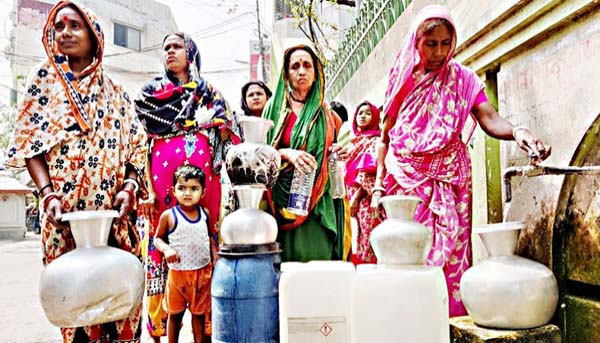Opinion Musharraf Tansen CLIMATE change has evolved from a distant environmental concern to an urgent global crisis, affecting every aspect of human life. Its impact is evident in rising temperatures, extreme weather events, shifting ecosystems and social disruptions. In Bangladesh, one of the world’s most climate-vulnerable nations, the effects are acute: rising sea levels, frequent ... Read more
Column
Youth leading the way in climate action
Opinion Musharraf Tansen AS THE world grapples with the escalating consequences of climate change, it has become clear that today’s youth are not only the most affected but also the most fervent advocates for change. Young people across the globe are stepping into critical roles as climate activists, leaders, innovators, and educators, determined to shape ... Read more
Social media pressure changing news making
Opinion Afsan Chowdhury THE relentless reality of social media has begun to influence news making at several levels. Three social media elements are making these pressures so strong. (a) It reaches consumers almost instantly and in no way can professional media compete with that. (b) Content creators can mix and offer audio-visuals that cost little ... Read more
Securing water for sustainable urban future
Opinion By AKM Mahmudul Haque WATER, the essence of life, is a precious resource that sustains our planet and its inhabitants. Yet, despite the vastness of our oceans, only a small portion of the water is potable. Recent studies have revealed alarming statistics that approximately 80 per cent of the water supplied in cities and ... Read more
We need to transform social norms for gender equality
World Population Day Views Md Nuruzzaman Khan World Population Day, which has been observed on July 11 every year since 1989, holds significant importance in addressing critical population-related issues. This year, the focus is on gender equality, symbolised by the theme of “Unleashing the power of gender equality: Uplifting the voices of women and girls ... Read more
Quality education for all, but quality schools for few?
Views Mohammad Ehsanul Islam Khan Education empowers and shapes nations. Increased enrollment and reading levels in Bangladesh have also enhanced education access. But the focus on quantity has overtaken the drive for quality education, leaving only a handful with access to top-notch universities. According to Dr John Dewey, “Education is not preparation for life; education ... Read more
Equal education leads to a better society
Opinion Mehreen Chowdhury EDUCATION is known to be strongest when voices and diverse perspectives are heard and shared around the community. It is vital that young people are given the space and safety to express them without feeling ashamed. The idea of special education is governed by the concept that education is for all. It ... Read more
Alarming increase in child marriage
Opinion Zillur Rahaman CHILD marriage is one of the social ills in Bangladesh. It was once an epidemic in Bangladesh. It, however, came under control because of various measures and the supervision of the government in the past decade or so, but has been increasing at an alarming rate since the Covid pandemic, which increased ... Read more
Time to prioritise social justice
Views We have the chance to reshape the world we live in – economically, socially, and environmentally. Gilbert F Houngbo May 1 is widely known as International Labour Day, a day when we celebrate the contribution of workers worldwide. It is a moment for pride, celebration, and hope. After three years of the Covid-19 crisis, ... Read more
More heatwaves are coming our way. Are we prepared?
Views While Bangladesh has a lot of experience in tackling cyclones and floods, we have not taken heat stress into consideration until now. Saleemul Huq The Intergovernmental Panel on Climate Change (IPCC) recently completed its sixth assessment report (AR6), with the Synthesis Report coming out in March. The Synthesis Report carries some key messages about ... Read more
Women must be at the forefront of the transition to a low-carbon economy
Opinion Veronica Mendizabal Joffre and Pinky Serafica Can we truly reimagine a path to a low-carbon transition and change the climate narrative? This is hard to envision when we witness the unprecedented damage we are inflicting on the planet. For women, the effects of climate change are already a lived experience. Where environments are damaged ... Read more
Why collaboration is in our collective interest
ViewsRMG NOTESClimate ActionWithout fashion retailers and their suppliers working together, our industry as a whole will continue to see emissions rising. Mostafiz Uddin According to the latest report of the UN Intergovernmental Panel on Climate Change (IPCC), the world is likely to fail to reach its most ambitious climate target – limiting global warming to ... Read more
Will our universities survive in 25 years?
Views Syed Saad Andaleeb Quality education is the backbone of a wholesome and prosperous society. But finding the “quality” in quality education continues to be elusive in Bangladesh. The “so called” universities (more like community colleges) are rife with social, economic, political and ideological problems that work against building learning organisations. Teachers, the kingpins, don ... Read more
Can teachers be the pivot of change in education?
Views Manzoor Ahmed “No system of education can be better than its teachers” is an aphorism that remains meaningful. The nostalgic and idealised image of the teacher as a scholar, dispensing knowledge and wisdom to the young selflessly, who lives a simple life with little concern for material rewards and who is looked upon by ... Read more
Climate loss and damage are clearly visible in southwest Bangladesh
Views Ashish Barua, Sawkat Chowdhury The Sixth Assessment Report (AR6) by Working Group I of the Intergovernmental Panel on Climate Change (IPCC) shows that the sea level, over the last 120 years, has increased by 0.20 metres, and continues rising fast, caused by thermal expansion, glacier ice loss, ice sheet loss, etc. The sea level ... Read more
How can Dhaka solve its traffic problem?
Views Debra Efroymson If I had a dollar for every time I’ve heard that “traffic was particularly bad today,” I could have retired already. Over the years, people have hazarded various suggestions as to the cause of the terrible Dhaka traffic and its potential solutions. Causes include: not enough roads for all the cars; poor ... Read more
Celebrating 50 years of global environmental movement
Opinion Saleemul Huq The global environmental movement started in 1972, with the first global environment conference held in Stockholm, Sweden, hosted by then Swedish Prime Minister Olof Palme. Among the heads of governments who also attended was the then Indian Prime Minister Indira Gandhi, who famously declared that environment and poverty were two major global issues ... Read more
Saving earth from disasters
Opinion By Md Zillur Rahaman TODAY is World Earth Day. The day is celebrated worldwide each year to show support for the protection of the environment. It was first observed in 1970 and is now held globally by the Earth Day Network. The UN-sponsored conference in Rio de Janeiro, Brazil, from June 3 to June 14, ... Read more
Women for women
Opinion Faria Rashid PATRIARCHAL societies like to deceive women into thinking that women cannot get along, work together and stand in support of one another. Given the patriarchal history of society, it has mostly worked to keep women in their places and apart from each other. This is why we hear so much about women ... Read more
CSR and a new order of business
From being seen as mere philanthropy and ‘doing good’, corporate social responsibility is now at the heart of business sustainability and ethical and accountable corporate behaviour Bitopi Das Chowdhury CSR or corporate social responsibility has been a buzz phrase for quite some time now. Not a day goes by without it being mentioned, albeit in ... Read more








